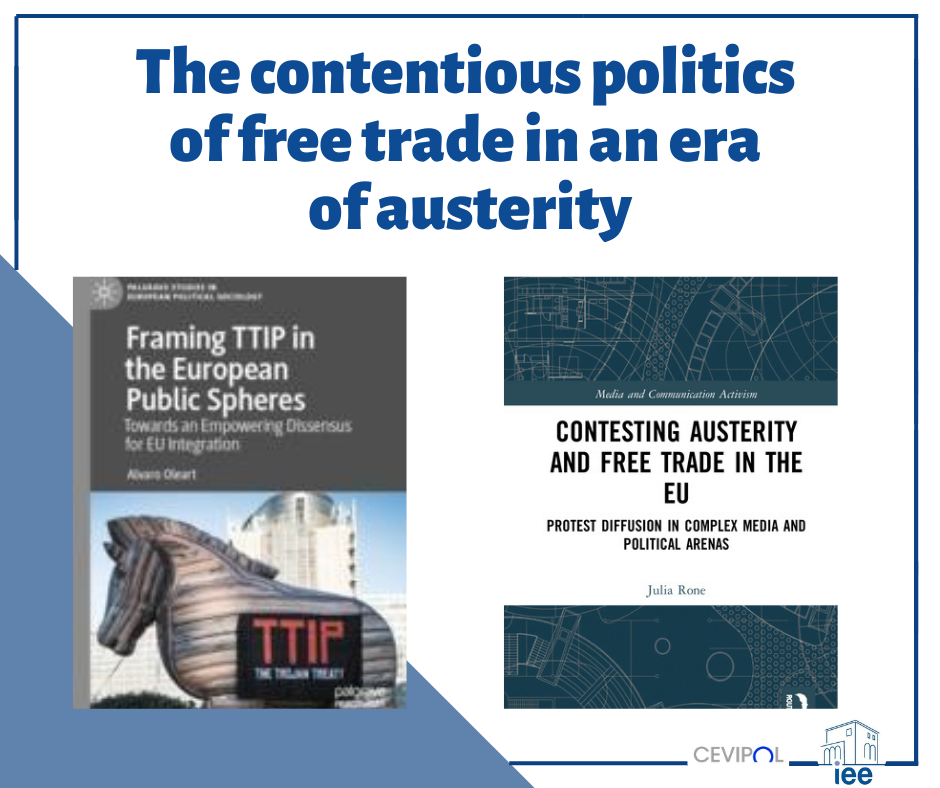Presenting the books “Framing TTIP in the European Public Spheres” (Palgrave, 2020) authored by Álvaro Oleart and “Constesting Austerity and Free Trade in the EU” (Routledge, 2020) by Julia Rone and establishing a dialogue between their work was the purpose of a double book organised by the Institute for European Studies and the Centre d’étude de la vie politique de l’ULB (CEVIPOL) on April 21, 2021.
Perfectly complementary in terms of their approach and empirical focus relating to the contestation of the EU trade policy, the books bring together former colleagues and friends of the ULB. Álvaro Oléart completed his PhD at the CEVIPOL-IEE after which he went to the Vrije Universiteit in Amsterdam to work as postdoctoral fellow, and is now working at Maastricht University – Studio Europa Maastricht. Julia Rone holds a PhD from the European University Institute in Florence and was until recently a post-doc fellow in a project on Conflicts of Sovereignty in the EU at the CEVIPOL-IEE. She is now a researcher at the University of Cambridge.
Niels Gheyle, also a recognized specialist of the politicization of trade in the European Union, commented the publications. Niels completed his PhD at Ghent University and is now working as a postdoctoral fellow at UCLouvain.
The discussion was moderated by Prof. Amandine Crespy, associate professor in Political Science and EU Studies, researcher at the CEVIPOL and the Institut d’études européennes (IEE-ULB).
“Framing TTIP in the European Public Spheres”
In a twist to the regular academic presentations, the concept of this double book launch brought the authors to present each other’s book, followed by a discussion of the points of convergence or divergence in their analyses lead by Niels Gheyle.
“The main idea in “Framing TTIP in the European Public Spheres” can be summarized as follows: Agonistic contestation brings legitimacy and matches policy with politics.”
Julia Rone
As Rone explained, a lot of the discussion about the politicization of the EU has focused on the dangers of politicization, and the way in which it might bring the dissolution of the Union. But for Julia Rone, Álvaro Oleart brings a different perspective: “we should not fear contestation since agonistic contention actually brings legitimacy to the Union and matches ‘policy with politics’.”
Beyond ‘Euroscepticism’
In Rone’s view, the particularly interesting aspects in Oleart’s book is the attempt to move beyond Euroscepticism by exploring conflicts around politics in the Union rather than the politics of the Union.
Furthermore, she found that in “Framing TTIP in the European Public Spheres” Oleart goes beyond the notion of “permissive consensus” that was later replaced by “constraining dissensus”. “What we have witnesssed with the discussions surrounding TTIP in the European public spheres was in fact an empowering dissensus.”
Oleart’s research shows that we can have different types of politicization. “What Oleart observed with TTIP is that basically we have politicization, but crucially it is agonistic, which means that the EU is accepted as a playing field while its policies are contested, a phenomenon conceptualized as an empowering dissensus.”
Theory and methods
Bridging the theory of public spheres and politicization theories was, to Rone, the theoretical basis of Oleart’s contribution. She considered the empirical cases, focused on the UK, France and Spain, are interesting “insofar each of these countries has had a different relation to the EU, so the debate on TTIP is influenced by the different historical relationships with the EU of these countries’ public spheres.”
Rone appreciated the fact that Oleart explored not only text but also visuals, the images that accompanied the media articles. “Once politicization increases, we see a lot of different actors appearing in the debate.”
More importantly, focusing on the type of politicization rather than the degree of politicization seemed, for Rone, “quite novel and very interesting.”
Conclusion and last thoughts on Oleart’s book
Rone summarized Oleart’s main conclusion by saying TTIP negotiations can be considered to have contributed to the normalization of the EU as a polity. She fully agreed and praised this distinction between agonistic and antagonistic politicization of the EU.
Rone pointed out the cases in which we have both agonistic and antagonistic politicization. In her view, TTIP could be considered itself as one of those cases. So, she asked to what extent has the choice of quality media influenced the observations; for her, the reason Oleart found only this type of discourse is his focus on quality media, which are progressive media, mainstream media and economic media. In her sense, if Oleart had focused on, for example, the British tabloids, he would have found a lot of examples of antagonistic politicization.
The Books
- Framing TTIP in the European Public Spheres (Palgrave, 2020), authored by Alvaro Oleart.
- Contesting Austerity and Free Trade in the EU (Routledge, 2020), authored by Julia Rone.
“Contesting Austerity and Free Trade in the EU”
In presenting Julia Rone’s “Contesting Austerity and Free Trade in the EU“, Álvaro Oleart aknowledged its quality and the many overlaps between this book and his own. Oleart explained that one shared feature is that rather than looking at the European level, both books focus their analyses on the national level, while exploring the transnational and European connections of civil society actors, trade unions, media and political parties.
From Oleart’s view, Rone’s book departs from an interesting observation: while we are seeing big protests against austerity in Spain, Greece and Portugal, we do not really see the same phenomenon in other EU member states, in spite of the similar austerity measures being implemented in countries such as Slovakia, Romania or Bulgaria. A similar process takes place in the context of the contestation against ACTA, which it is heavily politicized in some countries but not in others, and with TTIP.
“Differentiated politicization is therefore the leading puzzle of Rone’s book.”
Àlvaro Oleart
For him, the central question of Rone’s work is: Why is there such a big difference in the ways protests against austerity and free trade are diffused in the EU? And the contribution that this book puts forward, said Oleart, is explaining not only how but also why different types of protests managed or failed to diffuse across the EU.
Theory and methods
Oleart praised the bottom-up critique of the mainstream social movement literature. While his own book departs from the angle of political communication and the European Public Sphere, Rone’s book addresses differentiated politicization from social movements studies. “Contesting Austerity and Free Trade in the EU“, said Oleart, is ambitious in uncovering protest diffusion, which is conceived as the result of concrete actions taken by actual political players who organize political action and convince other people to join them.
Explaining differentiated politicisation
Oleart appreciated the actor-centric approach to social movements put forward by Rone, because it is the way social movements are built, through preexisting networks. “Actors play an important role in explaining how protest is diffused but also that constellation of actors enable that protests to be successful,” he said.
He added that by “looking at the actors it allows to explain precisely why certain mobilisations are successful in some countries and not in others, which is relevant when studying jointly social movements in Eastern Europe and in Western Europe.”
There is also, in his view, an important point about the role of the media that is taken both as a space and an actor. Oleart explained that all Rone’s analyses are nicely done through a triangulation of qualitative methods, this is a relevant point that also connects to his own book.
Conclusion and reflections
For Oleart, “Contesting Austerity and Free Trade in the EU” is an important contribution to the social movement literature for the aspects presented. “The case studies are very well chosen because it allows to take timing and protest cycles as a factor in differentiated politicization.”
While stressing the quality of the book, Oleart opened the debate with a rather political and empirical disagreement: Can ‘sovereignty’ ever be a winning frame for the development of transnational social movements in the EU context?
The discussant : Comparison between the books
Finally, Niels Gheyle, FNRS postdoctoral researcher at UCLouvain (Louvain-la-Neuve) and affiliated researcher at Ghent University intervened.
“The books compliment each other very well.”
Niels Gheyle
Niels Gheyle pointed out similarities. First is the that they started from the same idea, which is understanding how the process of fighting neoliberal hegemony takes place. Second, they focus on explaining protests, not from the perspective of structure, but agency. The third similarity is accounting for timing and attention as an important consideration when we think about agency. Fourth, is the coordination and organization. Fifth, what they show, in Gheyle’s view, is that much of these conflicts and protests diffusion is dependent also on the domestication of conflict from the European level to the national one. Sixth, is that both go beyond the ‘constraining dissensus’ analysis in regards to European integration.
Gheyle also pointed out differences such the implementation of the notion of differentiated politicization. Another difference is their point of view on the media. Lastly, that both books have normative considerations but in a different respect.




